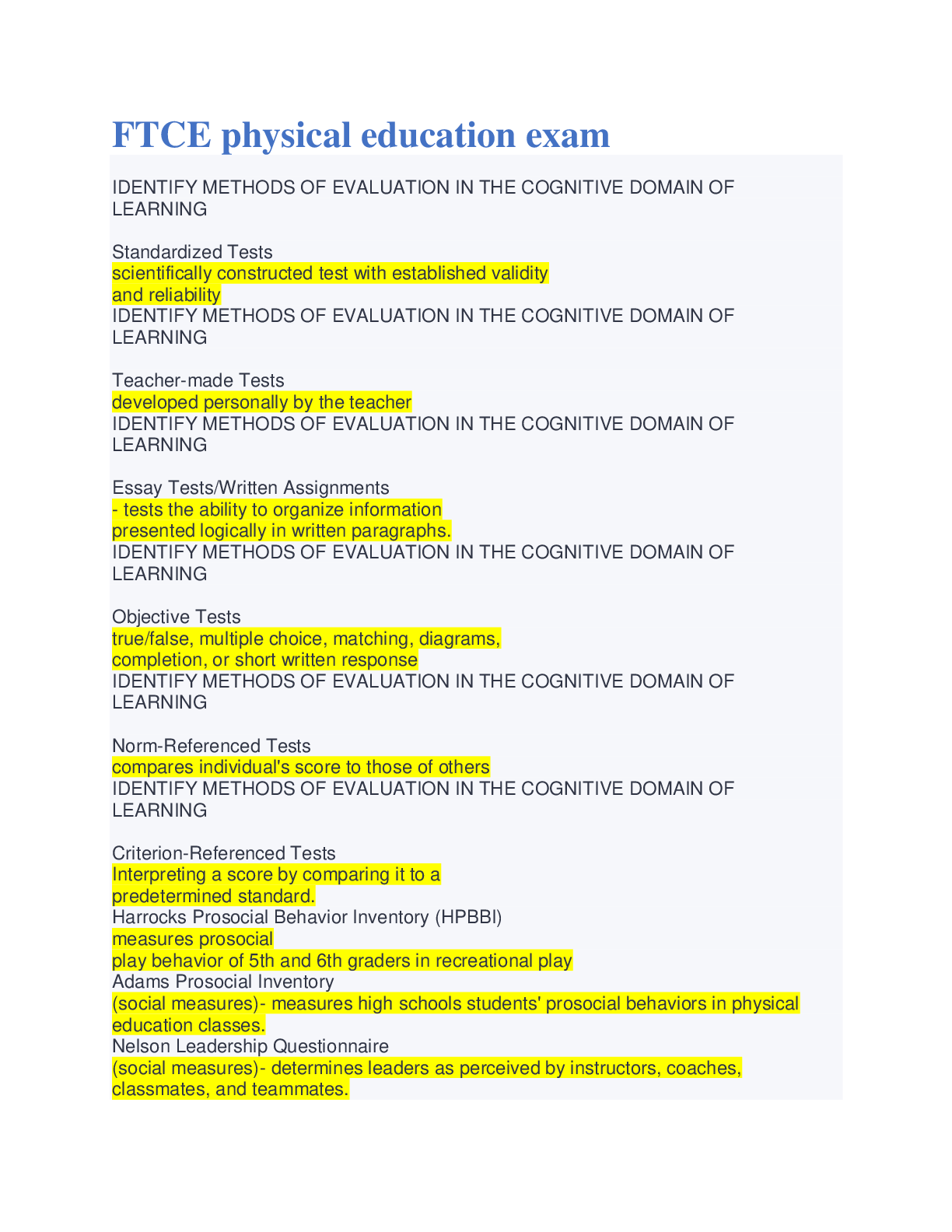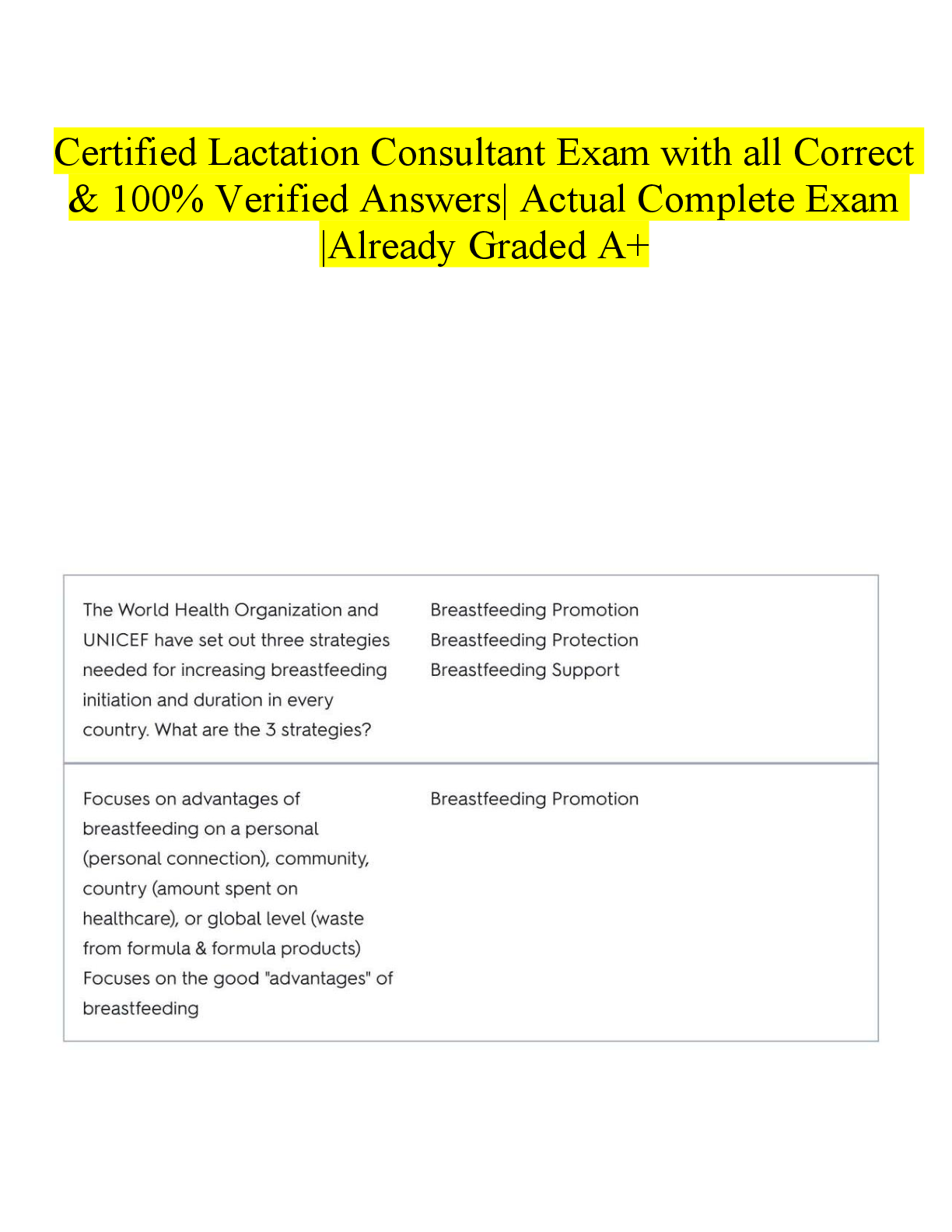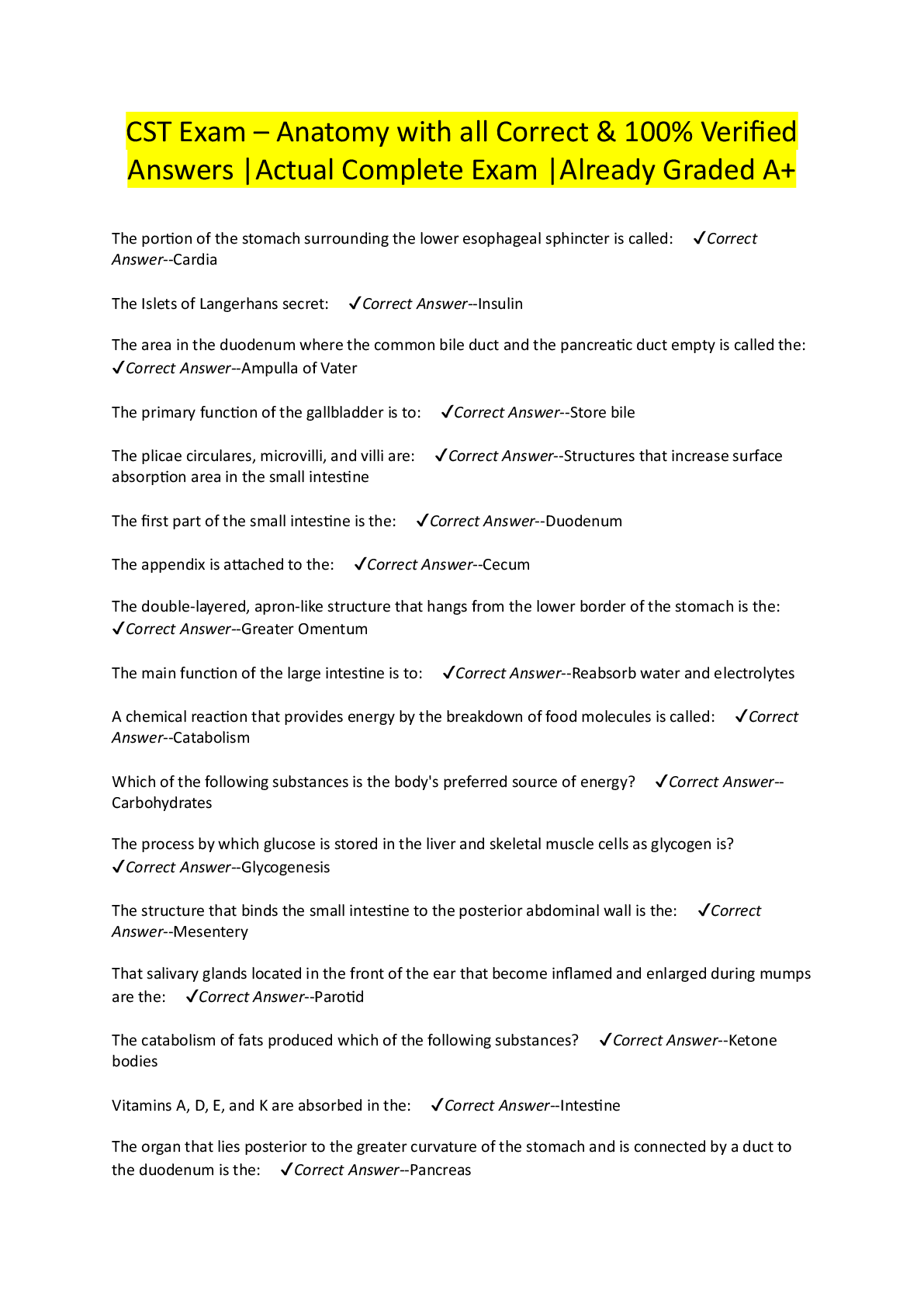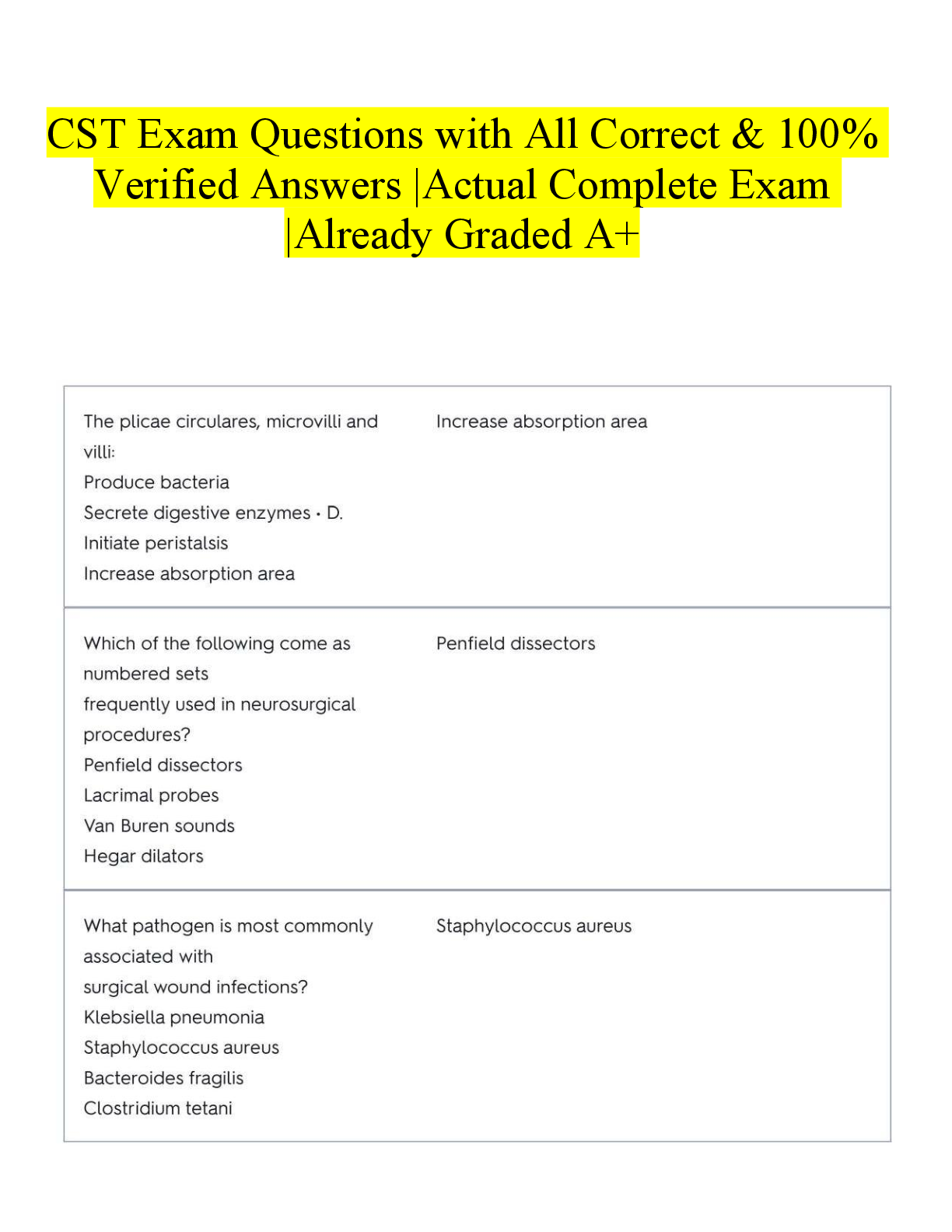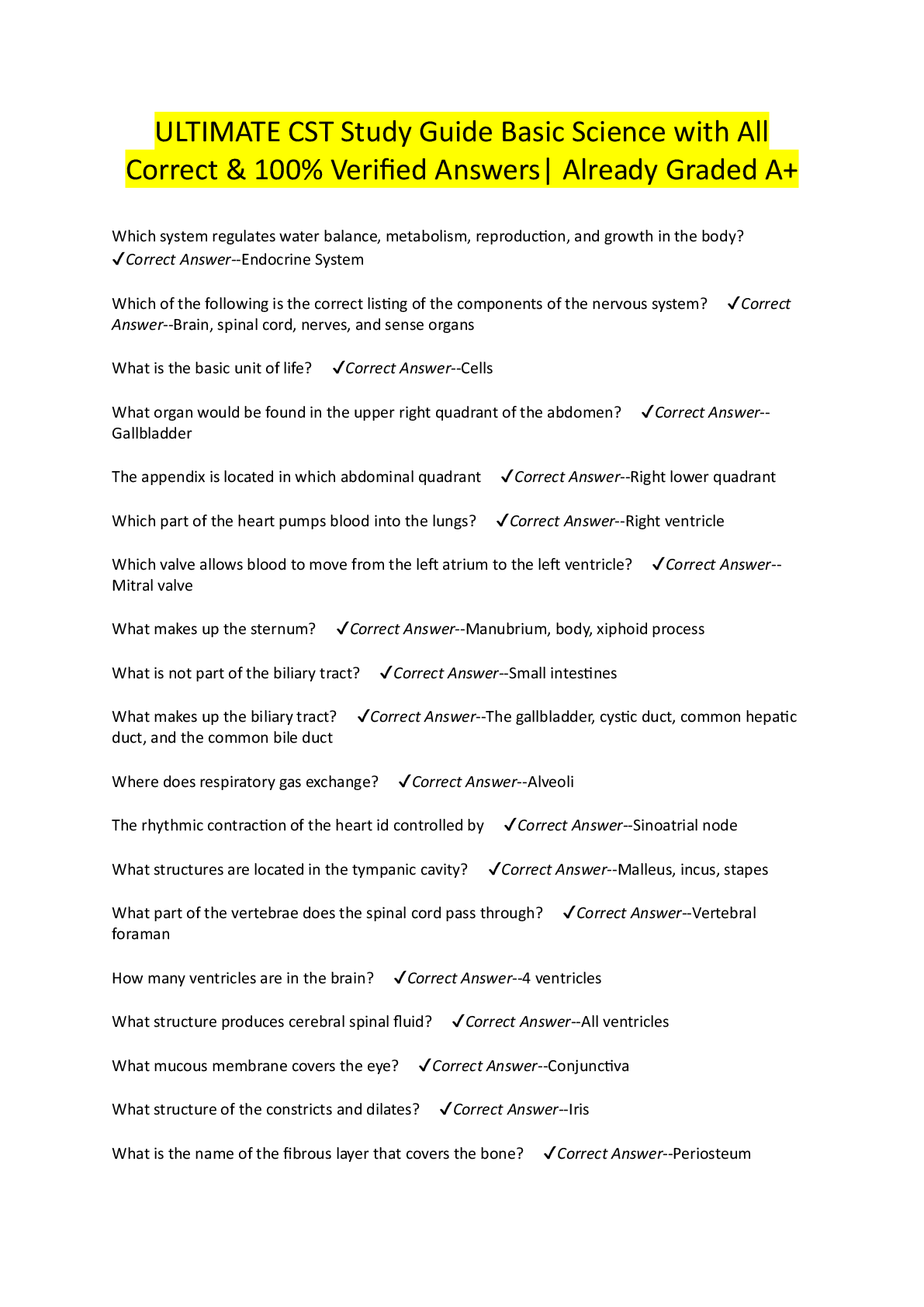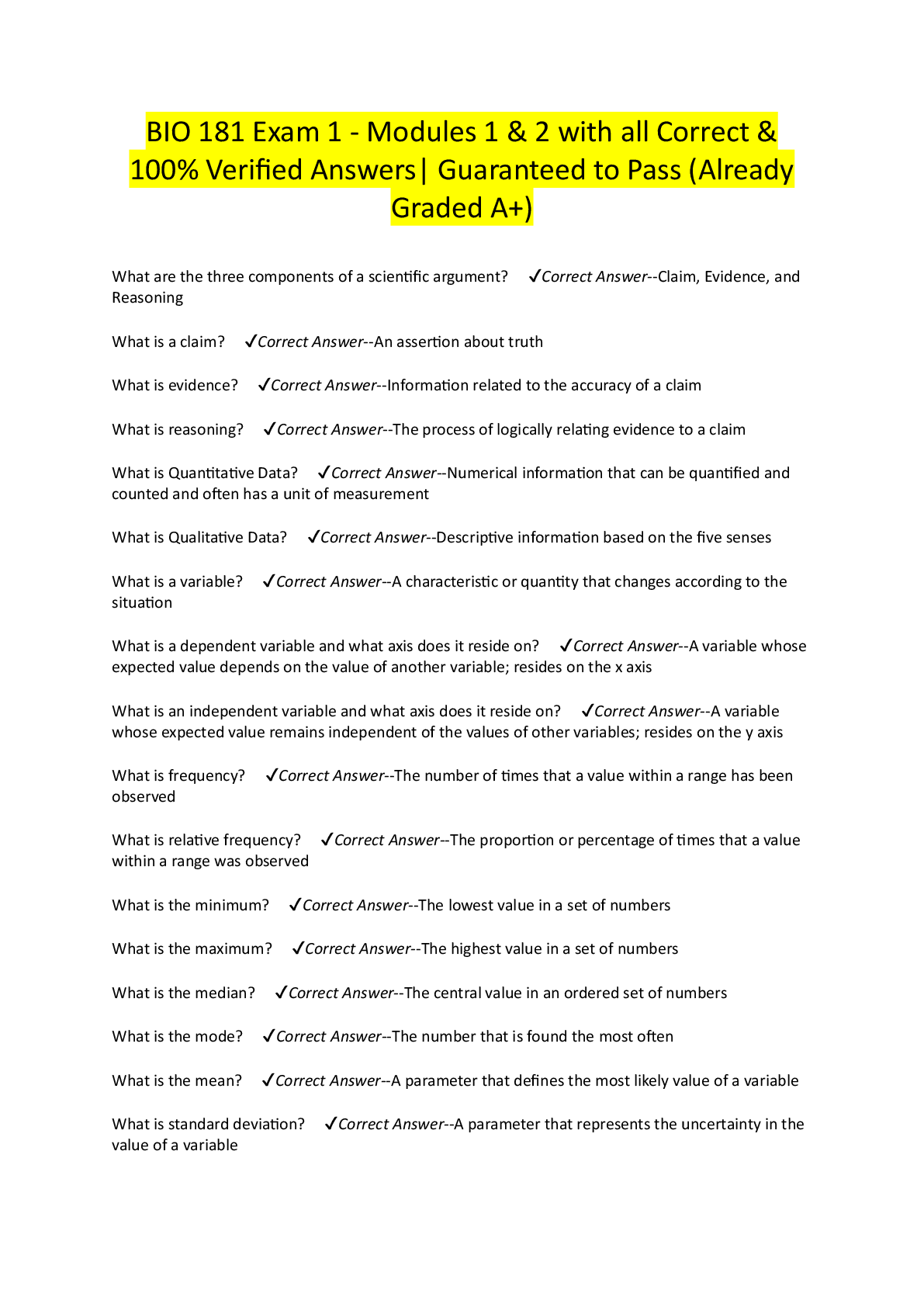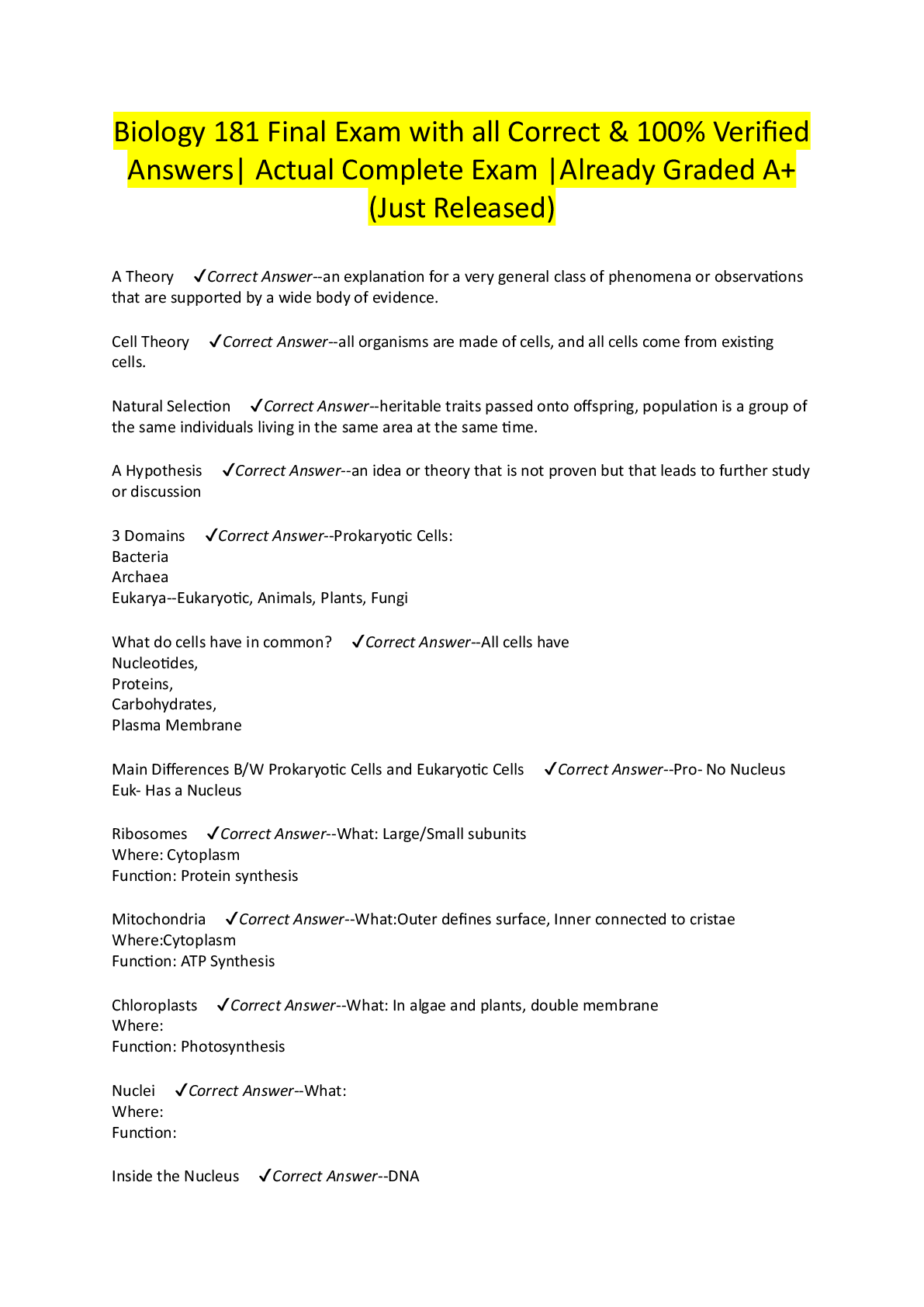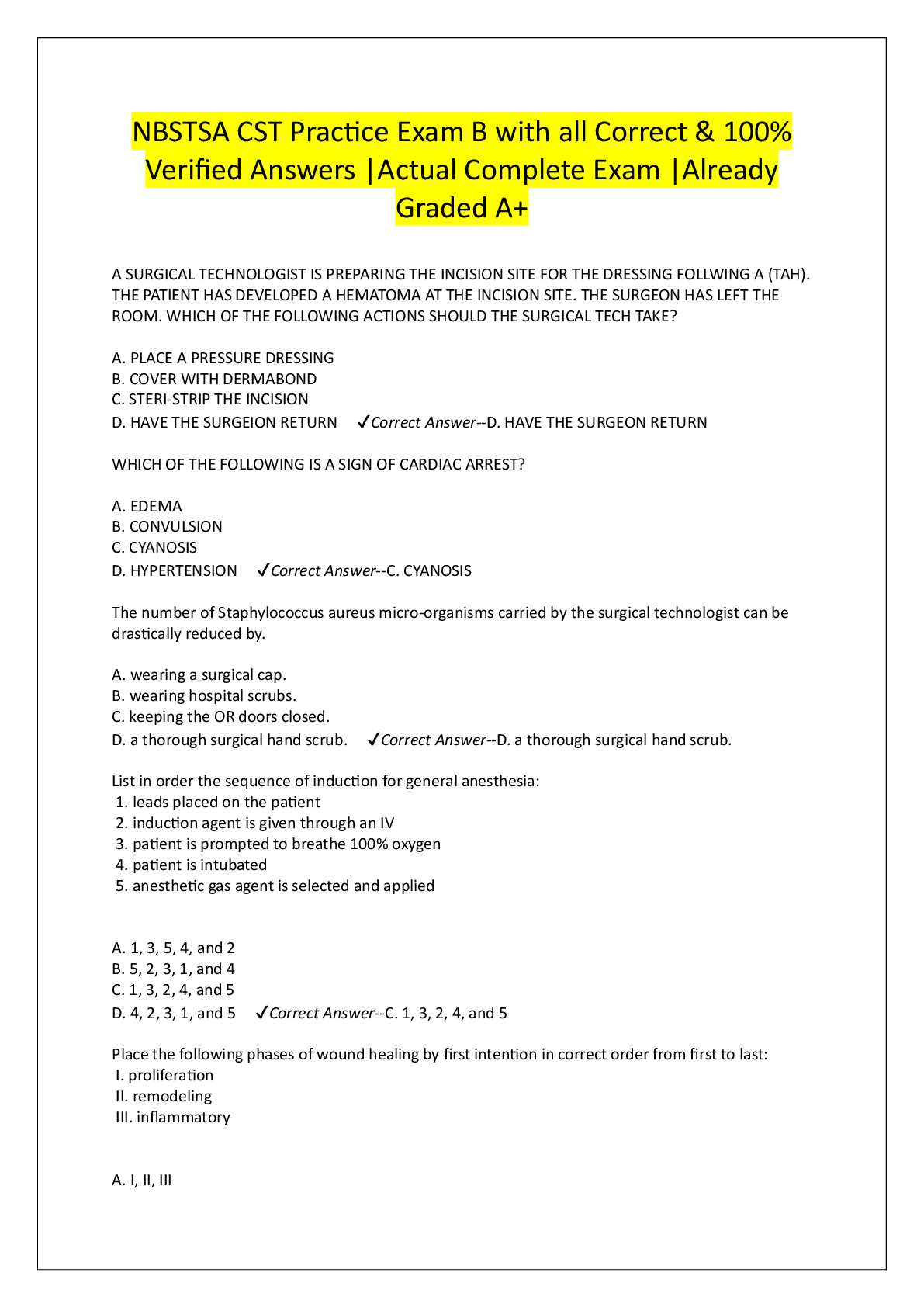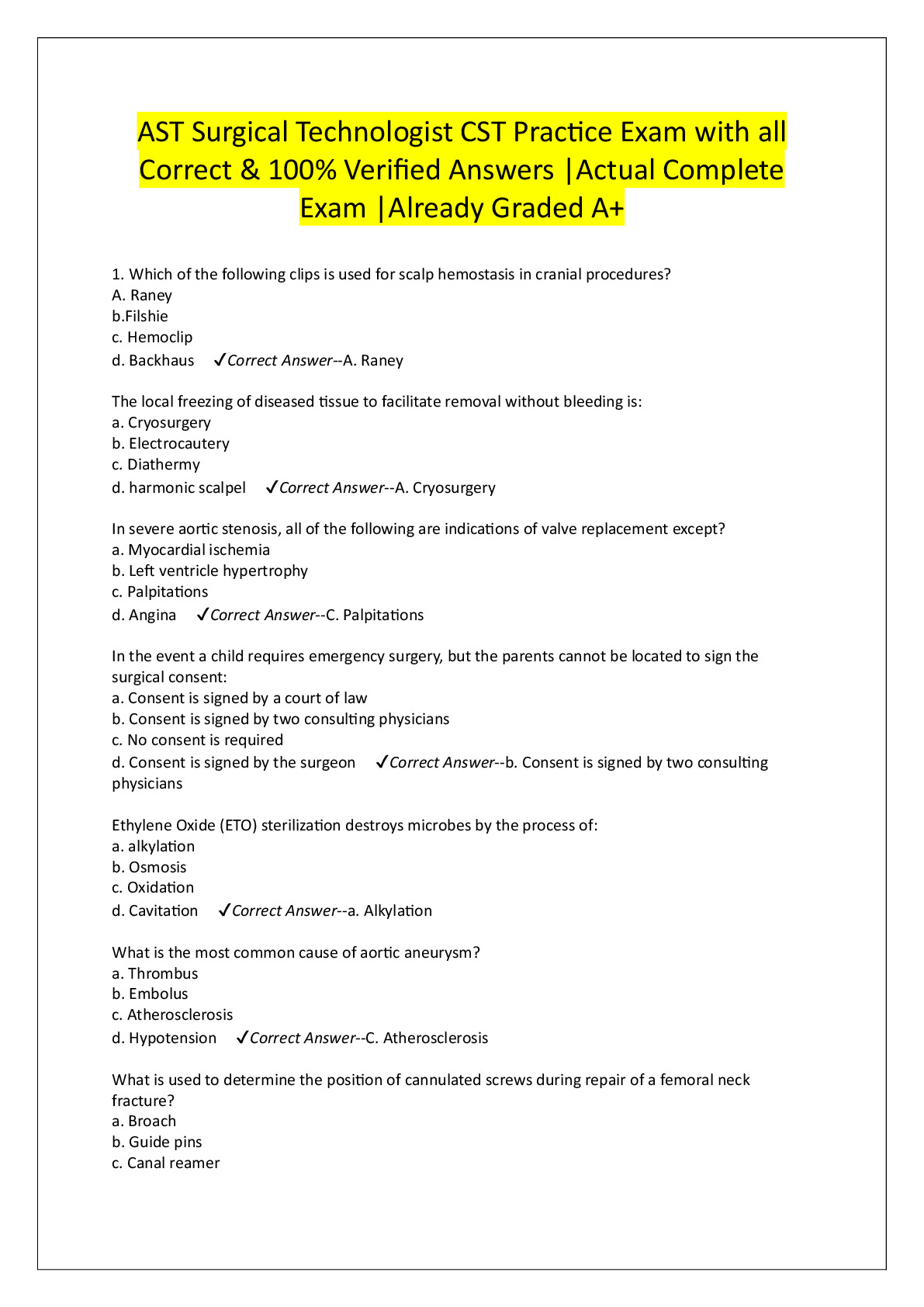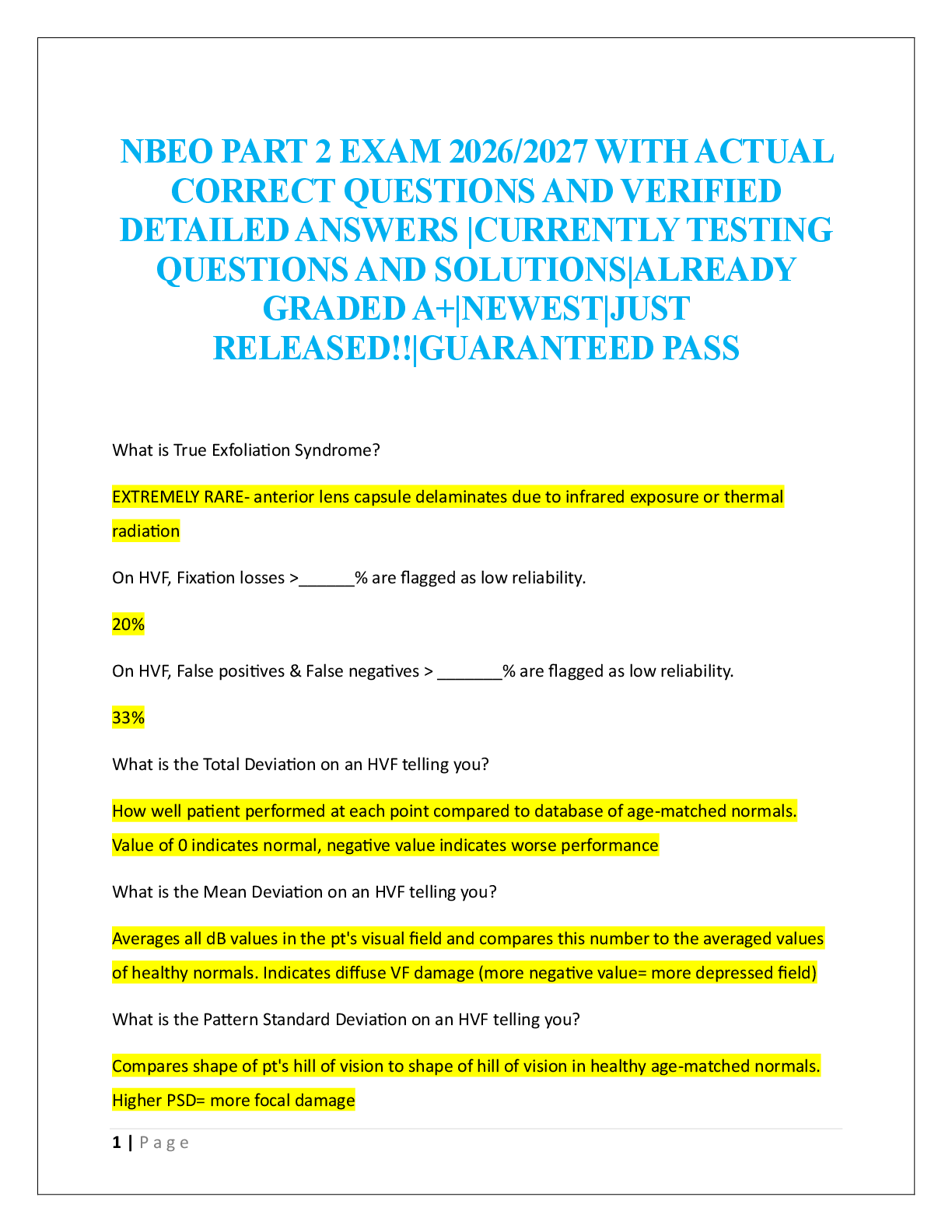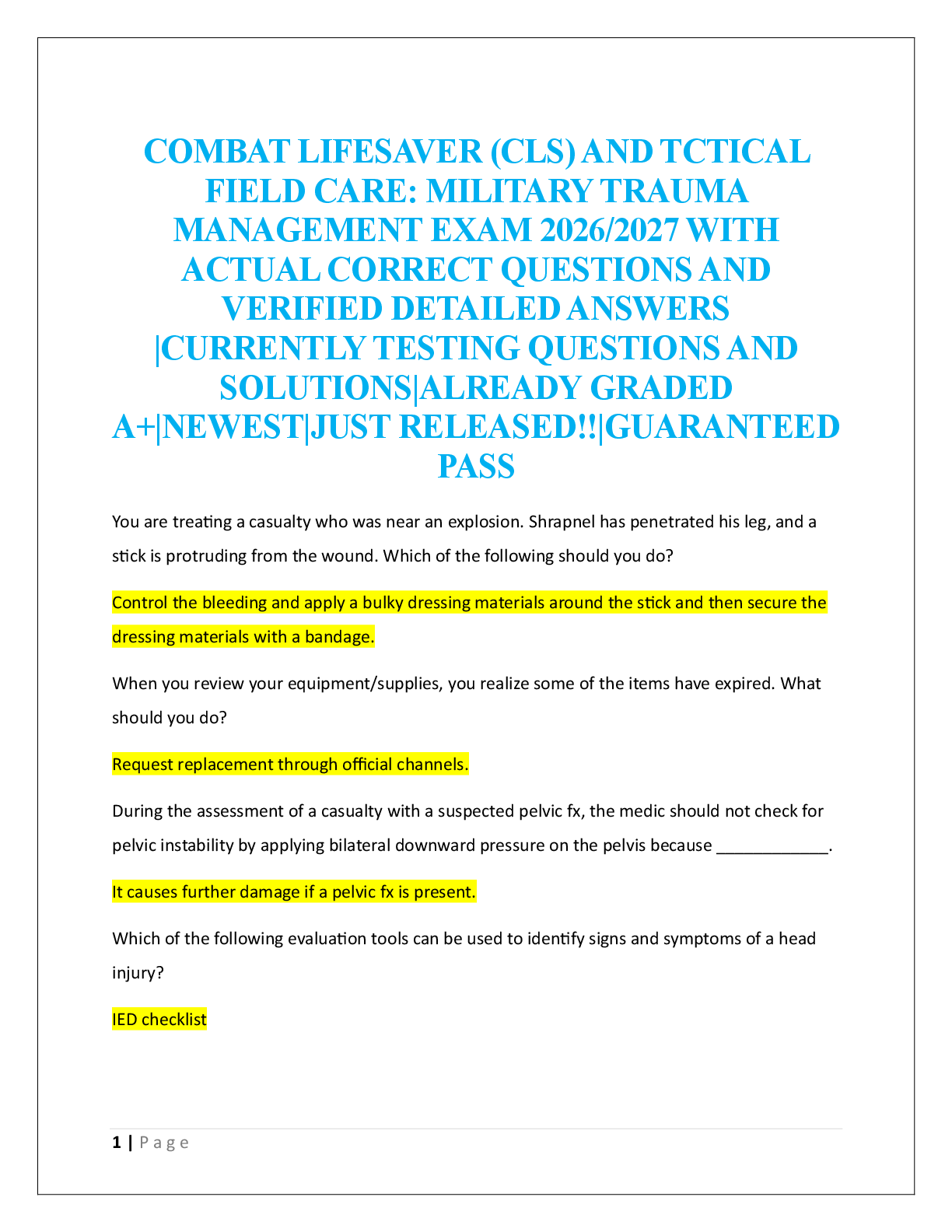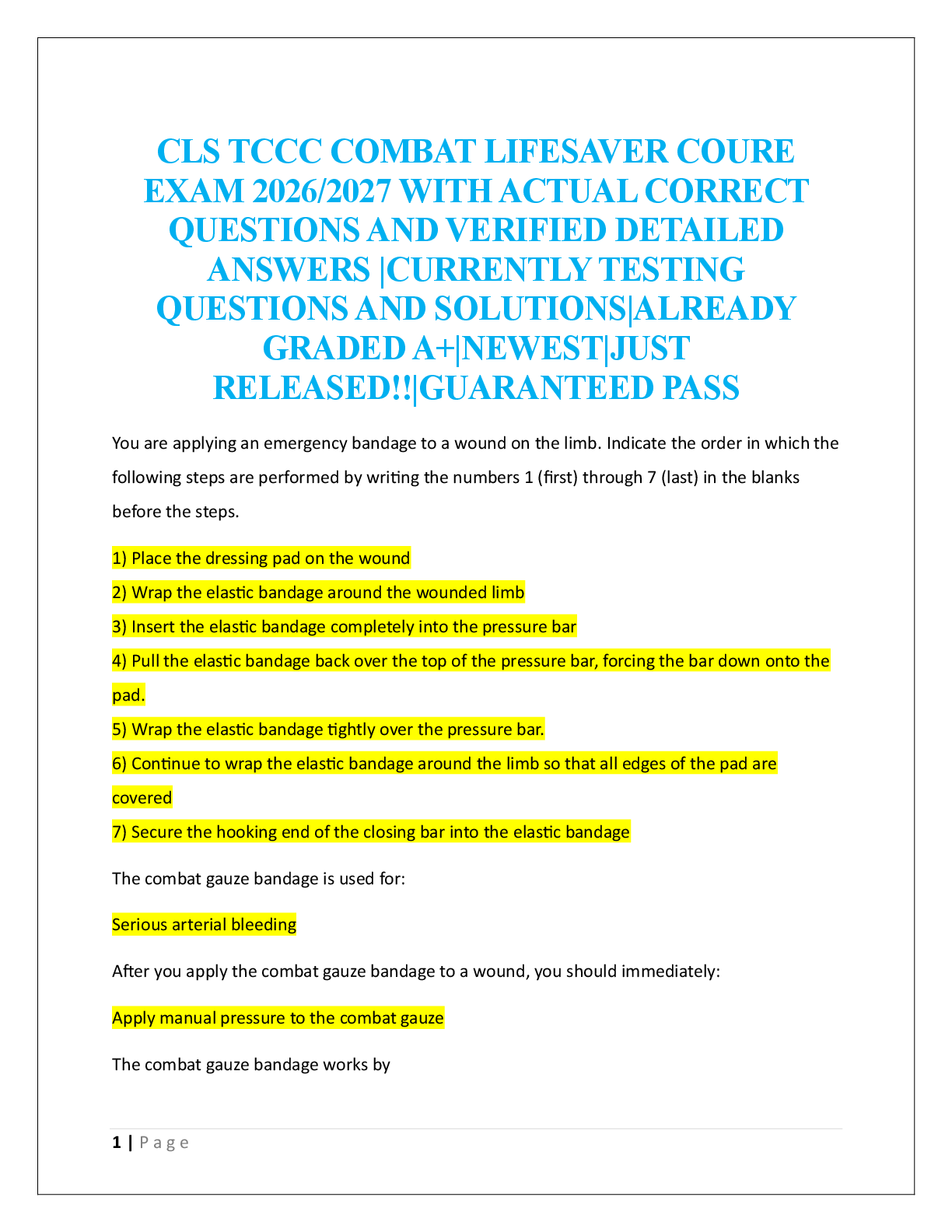state registration of securities QUESTIONS AND ANSWERS| GRADED A
Document Content and Description Below
Under the Uniform Securities Act, which of the following actions is NOT exempt from state registration? The sale of securities by a sheriff An isolated nonissuer transaction Transactions in excha ... nge-listed securities A Rule 147 offering Correct Answer: A Rule 147 offering Rule 147 covers intrastate offerings that are exempt from federal or SEC registration, but may be subject to state qualification. A transaction by a fiduciary such as an executor, sheriff, marshal, guardian, trustee in bankruptcy, and isolated nonissuer transactions are exempt under the Uniform Securities Act (USA). Any security listed on the New York Stock Exchange and securities listed on any other recognized national or regional exchanges are exempt from state registration. (62610) Which of the following securities may have their registration denied or revoked by the Administrator Securities issued by a nonprofit organization Municipal bonds Stock issued by a bank that is chartered in a different state U.S. Treasury bonds Correct Answer: Securities issued by a nonprofit organization Generally, states are not permitted to revoke an exemption that has been granted under the Securities Act of 1933. However, nonprofit securities (choice a), exchange-listed securities, and investment contracts for employee-benefits plans may be denied registration by the state Administrator. (67570) Which of the following nonissuer transactions would be exempt from registration under the Uniform Securities Act? The issuer is operating an Internet business and has not had a profit since going public The issuer is operating as a blank-check company that is investing in profitable companies The issuer is operating as a blind-pool company that is investing in companies that have been in business for at least two years The issuer is operating a company whose primary business is to engage in mergers and acquisitions Correct Answer: The issuer is operating an Internet business and has not had a profit since going public Under the USA, a nonissuer transaction may be exempt from registration if the issuer is engaged in business, whether or not the company is profitable. The USA specifically states that this exemption is not available if the issuer operates a blank-check, blind-pool, or shell company whose primary business plan is to engage in a merger or business combination. The answer here is not suggesting that a transaction in a security of an unprofitable company is exempt from registration; however, the other choices are definitely not considered exempt transactions. (62510) An agent misrepresents the risks associated with U.S. Treasury bills, notes, and bonds. Under the Uniform Securities Act, which of the following statements would BEST describe the consequences? This is viewed as unethical There are potential civil liabilities and the client may sue for damages U.S. Treasuries are subject to federal jurisdiction and, therefore, any liabilities incurred because of the misrepresentation of risk would be handled through federal courts and the SEC, not through states under the Uniform Securities Act Since these are exempt securities and not subject to credit risk, there is no potential misrepresentation of risk Correct Answer: There are potential civil liabilities and the client may sue for damages Misrepresenting the investment risks of a security could lead to civil liabilities, as clients have the right to sue to recover their losses. U.S. Treasury bills, bonds, and notes are securities and the fact that they are exempt securities is irrelevant if misrepresentations are made. Choice (a) is a true statement; however, it is fraudulent rather than unethical. (62011) Registration by coordination would most likely be used to register what type of offering? A new issue of mutual fund shares An initial public offering A new issue of shares listed on Nasdaq An intrastate offering Correct Answer: An initial public offering Under normal circumstances, the method of registration most often used by the new issuers of securities is registration by coordination. Mutual funds are federal covered securities. All listed securities, such as Nasdaq securities, are also federal covered and, therefore, exempt from registration with the states. Intrastate offerings are commonly registered by qualification. (89680) Which of the following statements is/are TRUE regarding the registration of securities under the Uniform Securities Act? A security is considered registered for one year from the effective date of its registration statement. Once the registration statement is declared effective by the Administrator, the security is considered to be registered as long as the issuer files quarterly and annual financial statements. If the registration statement for a security is declared effective by the Administrator of one state, it is also effective in any state in which an identical registration statement has been filed. The filing of a registration statement may be done by a person other than the issuer. II only I and IV only I, III, and IV only II, III, and IV only Correct Answer: I and IV only A registration statement is effective for one year from its effective date. A registration statement may be filed by the issuer, a registered broker-dealer, or any other person on whose behalf the offering is to be made. The other statements are not true. (62972) Under the Uniform Securities Act, an institutional investor: Has a minimum of $1.5 million invested in securities Has a minimum of $100 million under management Is designated by rule or order of the Administrator Is any financial institution Correct Answer: Is designated by rule or order of the Administrator Under Sec. 201(c) of the USA, an institutional investor is designated by rule or order of the Administrator. (62781) Under Regulation D of the Securities Act of 1933, accredited investors include: Accountants Insurance companies Any senior officer of a publicly traded company Individuals with a net worth of one million dollars or more I and II only II and IV only III only I, III, and IV only Correct Answer: II and IV only No single profession is specified in the definition of an accredited investor. Senior officers are included if they are senior officers of the issuer. Institutional investors, such as insurance companies, are specified in the regulation. A person with annual income of $200,000, or net worth of $1 million, is also considered accredited. (62066) Which of the following choices would NOT meet the definition of an exempt transaction? A transaction by a trustee involved in a bankruptcy An unsolicited nonissuer transaction with a retail investor Transactions between an issuer and retail investors A transaction executed by a bona fide pledgee Correct Answer: Transactions between an issuer and retail investors Any transactions by trustees involved in a bankruptcy--sheriffs, marshals, guardians, and other fiduciaries are considered exempt transactions. Unsolicited nonissuer transactions whether with retail or institutional investors and transactions executed by a bona fide pledgee are also considered exempt transactions. However, transactions between issuers and retail investors are not exempt from registration. A transaction between an issuer and underwriter would be an exempt transaction. (62396) Under the Uniform Securities Act, the sale of limited partnership interests to a bank is exempt from: The antifraud provisions The registration requirements The filing requirement for advertisements I only II only II and III only I, II, and III Correct Answer: II and III only Any sale of securities to an institution (e.g., a bank) is considered an exempt transaction under the USA. This exempts the securities from registration and any related advertising from being filed with the Administrator. However, no person, security, or transaction is exempt from the antifraud provisions of the Uniform Securities Act. (67655) According to the Uniform Securities Act, which of the following statements is NOT TRUE concerning private placements? The offer may not be made to more than 10 persons in that state during any 12-month period The offer may not be made to more than 35 persons in that state during any 12-month period The offer may be made to any number of institutional investors during any 12-month period Commissions may not be paid if the buyers are noninstitutional customers Correct Answer: The offer may not be made to more than 35 persons in that state during any 12-month period Under the Uniform Securities Act, any transaction involving no more than 10 persons (there is no limit on institutional accounts) is considered an exempt transaction known as a private placement, if the following conditions are met. The seller believes that all the noninstitutional buyers are purchasing for investment purposes only. No commission or other remuneration is paid for soliciting noninstitutional buyers. Choice (b) refers to a condition for private placements under Regulation D of the Securities Act of 1933. (62 [Show More]
Last updated: 3 years ago
Preview 1 out of 23 pages
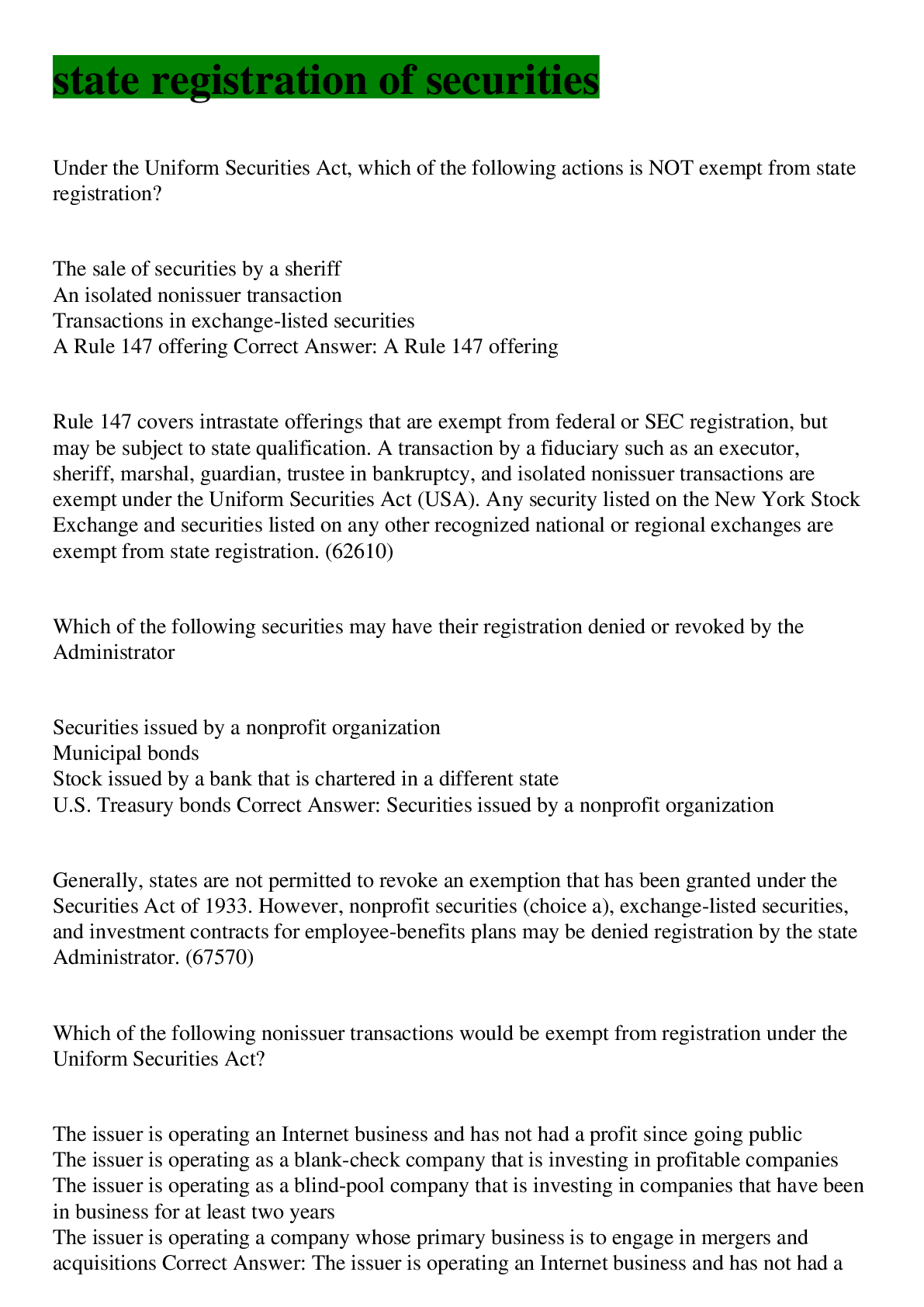
Buy this document to get the full access instantly
Instant Download Access after purchase
Buy NowInstant download
We Accept:

Reviews( 0 )
$10.00
Can't find what you want? Try our AI powered Search
Document information
Connected school, study & course
About the document
Uploaded On
Sep 23, 2022
Number of pages
23
Written in
All
Additional information
This document has been written for:
Uploaded
Sep 23, 2022
Downloads
0
Views
74












